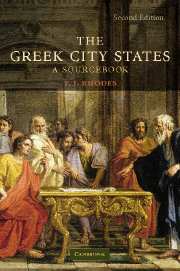Book contents
- Frontmatter
- Contents
- List of Maps
- Preface to the First Edition
- Preface to the Second Edition
- Map 1 The Greek World
- Map 2 Attica
- Introduction
- 1 The Homeric State
- 2 The Archaic State
- 3 Economic and Political Development; Tyranny and After
- 4 Sparta
- 5 Athens
- 6 Women and Children
- 7 Economic Life
- 8 Religion
- 9 Other Cities
- 10 Beyond the Single City
- 11 The Hellenistic and Roman Periods
- Bibliography
- Index of Texts
- Index of Names and Subjects
8 - Religion
Published online by Cambridge University Press: 05 June 2012
- Frontmatter
- Contents
- List of Maps
- Preface to the First Edition
- Preface to the Second Edition
- Map 1 The Greek World
- Map 2 Attica
- Introduction
- 1 The Homeric State
- 2 The Archaic State
- 3 Economic and Political Development; Tyranny and After
- 4 Sparta
- 5 Athens
- 6 Women and Children
- 7 Economic Life
- 8 Religion
- 9 Other Cities
- 10 Beyond the Single City
- 11 The Hellenistic and Roman Periods
- Bibliography
- Index of Texts
- Index of Names and Subjects
Summary
Greek religion was polytheistic. It is commonly said that it required correct practice rather than correct belief or a healthy spiritual state. Of course, people would not worship the gods unless they believed that the gods existed and believed certain things about them; and, if they did hold such beliefs, good performance of their religious duties and worldly success which they might attribute in part to that performance, or the reverse, would have some effect on their spiritual state. However, it is largely true that there was no body of doctrine by which people might be judged orthodox or heretical (but see passage 325, on the charges against Socrates) and that Greek religion was much less concerned than Christianity with people's internal spiritual state: a religious person was one who was punctilious in performing religious rites, and in letting oracles, omens and the like influence decisions in day-to-day life, and an irreligious person was one who was not.
GREEK RELIGION
Local variations on a Greek theme
Not only were there major gods and various lesser divinities. What were thought of as the same gods had different manifestations in different places: there was Apollo of Delphi and Apollo of Delos; in Athens Athena was primarily Athena Polias, the protector of the polis; but there was also on the acropolis a temple of Athena Nike, the goddess of victory (cf. passage 327).
- Type
- Chapter
- Information
- The Greek City StatesA Source Book, pp. 198 - 213Publisher: Cambridge University PressPrint publication year: 2007



